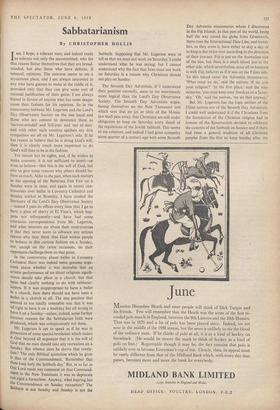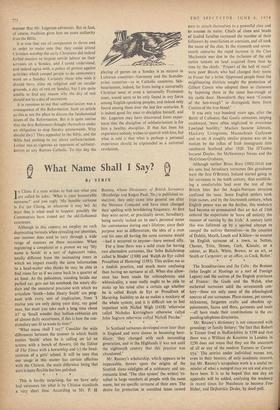Sabbatarianism
By CHRISTOPHER HOLLIS T AM, I hope, a tolerant man, and indeed ready Ito tolerate not, only the uncommitted, who for that reason flatter themselves that they are broad- minded, but also those who have definite, if unusual, opinions. The universe seems to me a mysterious place, and I am always interested in any who have guesses to make at the riddle of it, provided only that they can give some sort of rational justification of their guess. I am always biased in favour of anyone who has some deeper cause than fashion for his opinions. So in the controversy between Mr. Legerton and the Lord's Day Observance Society on the one hand and those who are content to denounce them as 'narrow-minded' and 'kill-joys' and 'out of date' and with other such emotive epithets my first sympathies are all on Mr. Legerton's side. If he has reason to believe that he is doing God's will, then it is clearly much more important to do God's will than to be in the fashion.
Yet reason has its rights, and, if he wishes to make converts, it is not sufficient to assert—or even to believe—that this is the will of God, but also to give some reasons why others should be- lieve as much. Alike in the past, when such matters as the opening of the Battersea Fun 'Fair on a Sunday were in issue, and again in recent con- troversies over ballet in Coventry Cathedral and Sunday cricket at Bromley, I have studied the literature of the Lord's Day Observance Society —indeed I pass its offices every time that I go to have a glass of sherry at El Vino's, which hap- pens not infrequently—and have had some courteous, correspondence from Mr. Legerton, and what interests me about their controversies is that they never seem to advance any serious reason why they think that God wishes people to behave in this curious fashion on, a Sunday, nor, except on the rarest occasions, do their opponents challenge them on that point.
In the controversy about ballet in Coventry Cathedral there was indeed some genuine argu- ment about whether it was desirable that an artistic performance of no direct religious signifi- cance should take place in a church, but that issue had clearly nothing to do with sabbatar- ianism. If it was inappropriate to have a ballet in a church, then there should not have been a ballet in a church at all. The one position that seemed to me totally untenable was that it was all right to have it on a weekday but all wrong to have it on a Sunday—unless, indeed, some further intrinsic reasons for the Sabbatarian faith were Produced, which was conspicuously not done.
Mr. Legerton is apt to speak as if he was in possession of some special revelation which makes it clear beyond all argument that it is the will of God that no man should take any recreation on a Sunday. But whence does he derive that revela- tion? The only Biblical quotation which he gives is that of the Commandment, 'Remember that thou keep holy the Sabbath day.' But, in so far as Our Lord made any comment on that Command- ment in the New Testament it was to deprecate too rigid a formalism. Anyway, what bearing has the Commandment on Sunday recreation? The Sabbath is not Sunday and Sunday is not the Sabbath. Supposing that Mr. Legerton were to tell us that we must not work on" Saturday,'I could understand what he was saying, but I cannot understand why the fact that Jews must not work on Saturday is a reason why Christians should not play on Sunday.
The Seventh Day Adventists, if I understand their position correctly, seem to me enormously more logical than the Lord's Day Observance Society. The Seventh Day Adventists argue, basing themselves on the New Testament text which says that no jot or tittle of the Mosaic law shall pass away, that Christians are still under obligation to keep on Saturday every detail of the regulations of the Jewish Sabbath. This seems to me coherent, and indeed I had great sympathy some quarter of a century ago with some Seventh Day Adventist missionaries whom I discovered in the Fiji Islands. In that part of the world, being half the way round the globe from Greenwich, there runs the International Date Line, and travel- lers, as they cross it, have either to skip a day or to keep a day twice over according to the direction of their journey. Fiji is just on the Australian side of the line, but there is a small island just to the other side, which nevertheless, since all its business is with Fiji, behaves as if it was on the Fijian side. To this island came the Adventist missionaries. `What must we do,' said the natives, 'if we join your religion?' 'In the first place,' said the mis- sionaries, 'you must keep your Sundays on a Satur- day.' Oh,' said the natives, 'we do that anyway.'
But Mr. Legerton .has the logic neither of the Fijian natives nor of the Seventh Day Adventists. I could well understand it if the Christians from the foundation of the Christian religion had in honour of the Resurrection decided to celebrate the customs of the Sabbath on Sunday and if there had been a general tradition of all Christian peoples from the first to keep Sunday after the manner that Mr. Legerton advocates. But in fact, of course, tradition gives him no more authority than the Bible.
It is true that out of compassion to slaves and in order to make sure that they could attend Christian worship the early Christians did indeed forbid masters to impose servile labour on their servants on a Sunday, and I could understand, and indeed agree with, a policy of protest against activities which compel people to do unnecessary work on a Sunday. Certainly those who wish it should have, alike on religious and on secular grounds, a day of rest on Sunday, but I am quite unable to find any reason why the day of rest should not be a day of recreation.
It is common to say that sabbatarianism was a consequence of the Reformation. Such an article as this is not the place to discuss the fundamental issues of the Reformation. But it is quite untrue that the first Reformers thought themselves under an obligation to stop Sunday amusements. Why should they? They appealed to the Bible, and the Bible had nothing to say about sabbatarianism. Luther was as vigorous an opponent of sabbatar- ianism as any Roman Catholic. To this day the playing of games on a Sunday is as natural in Lutheran countries—Germany and the Scandin- avian countries—as in Catholic countries. Sab- batarianism, indeed, far from being a universally Christian tenet or even a universally Protestant tenet, would seem to be only found in any force among English-speaking peoples, and indeed only found among them over the last few centuries. It is indeed good for man to discipline himself, and Mr. Legerton may have discovered from exper- ience that the discipline of sabbatarianism is for him a healthy discipline. If that has been his experience nobody wishes to quarrel with him, but what is odd is that what is perhaps a personal experience should be expounded as a universal revelation.











































 Previous page
Previous page